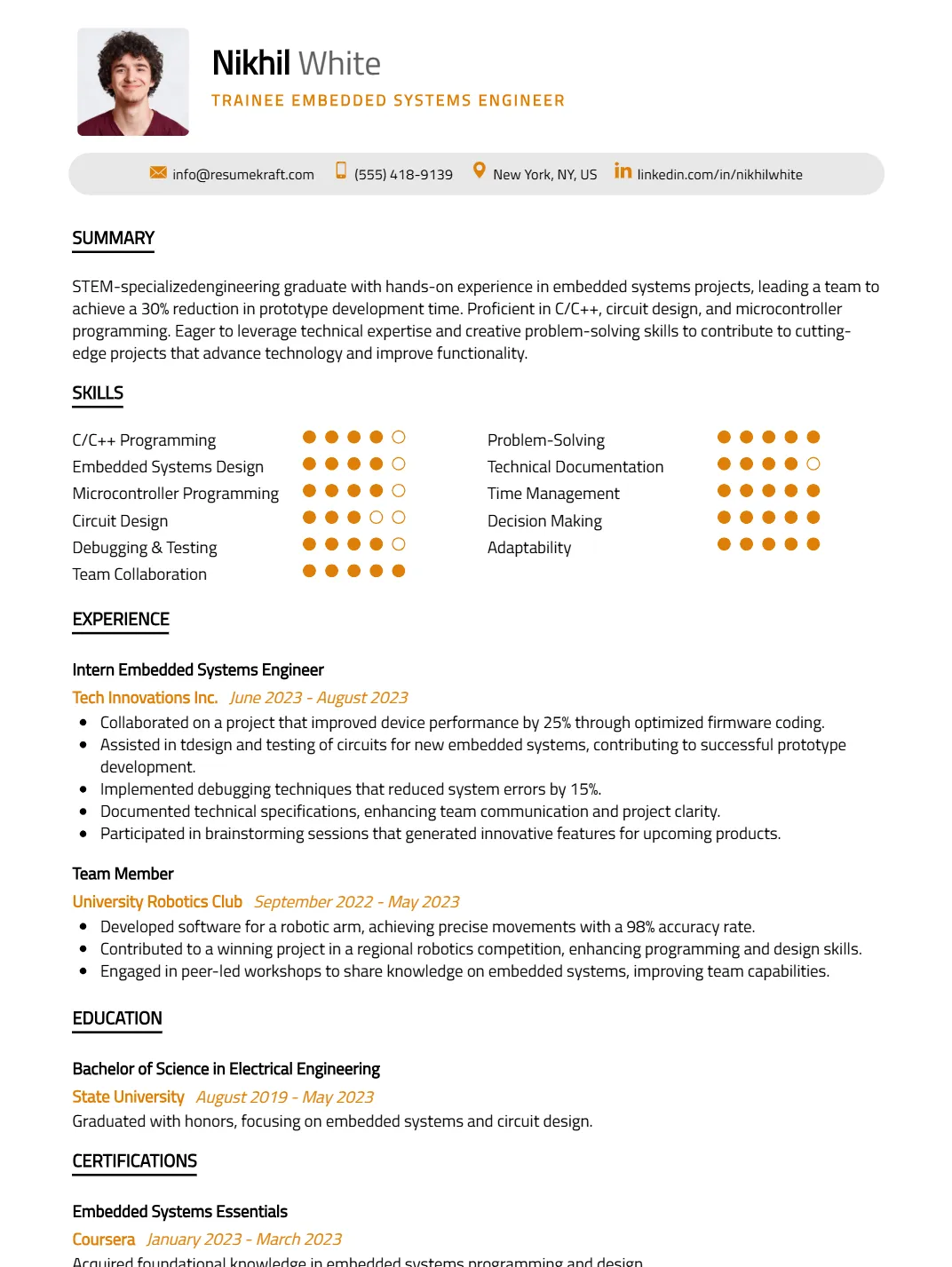
As an entry-level Embedded Systems Engineer, freshers embark on a dynamic career path that involves designing and programming embedded systems that power everything from consumer electronics to automotive applications. This role is crucial as it combines hardware and software expertise to create innovative solutions in a tech-driven world. However, new graduates often face challenges due to limited experience. This article will guide freshers in crafting compelling resumes that highlight their academic projects, internships, and transferable skills, helping them stand out in today’s competitive job market and seize valuable opportunities in the field.
- Fresher Embedded Systems Engineer resume examples
- Fresher Embedded Systems Engineer resume format
- Fresher Embedded Systems Engineer resume with no experience
- How to list your hard skills and soft skills on your fresher resume
- How to list your education and certifications on your fresher resume
- How to write your fresher Embedded Systems Engineer resume summary or objective
- Additional sections for a fresher Embedded Systems Engineer resume
- Key takeaways for writing a professional fresher Embedded Systems Engineer resume
- Frequently Asked Questions for Fresher Embedded Systems Engineer Resumes
- How long should my fresher Embedded Systems Engineer resume be?
- What is the best format for a fresher Embedded Systems Engineer resume?
- How can I make my fresher Embedded Systems Engineer resume stand out without work experience?
- What should I include in my fresher Embedded Systems Engineer resume if I have no relevant experience?
Fresher Embedded Systems Engineer resume examples
Embedded Systems Engineer resume examples are essential for new graduates and entry-level job seekers as they provide a clear framework for showcasing skills and qualifications. These examples help beginners grasp what recruiters prioritize, such as technical proficiencies, academic projects, and internships, even in the absence of extensive work experience. By analyzing these samples, freshers can craft compelling resumes that effectively highlight their potential and make a strong impression in a competitive job market.
Fresher Embedded Systems Engineer Resume
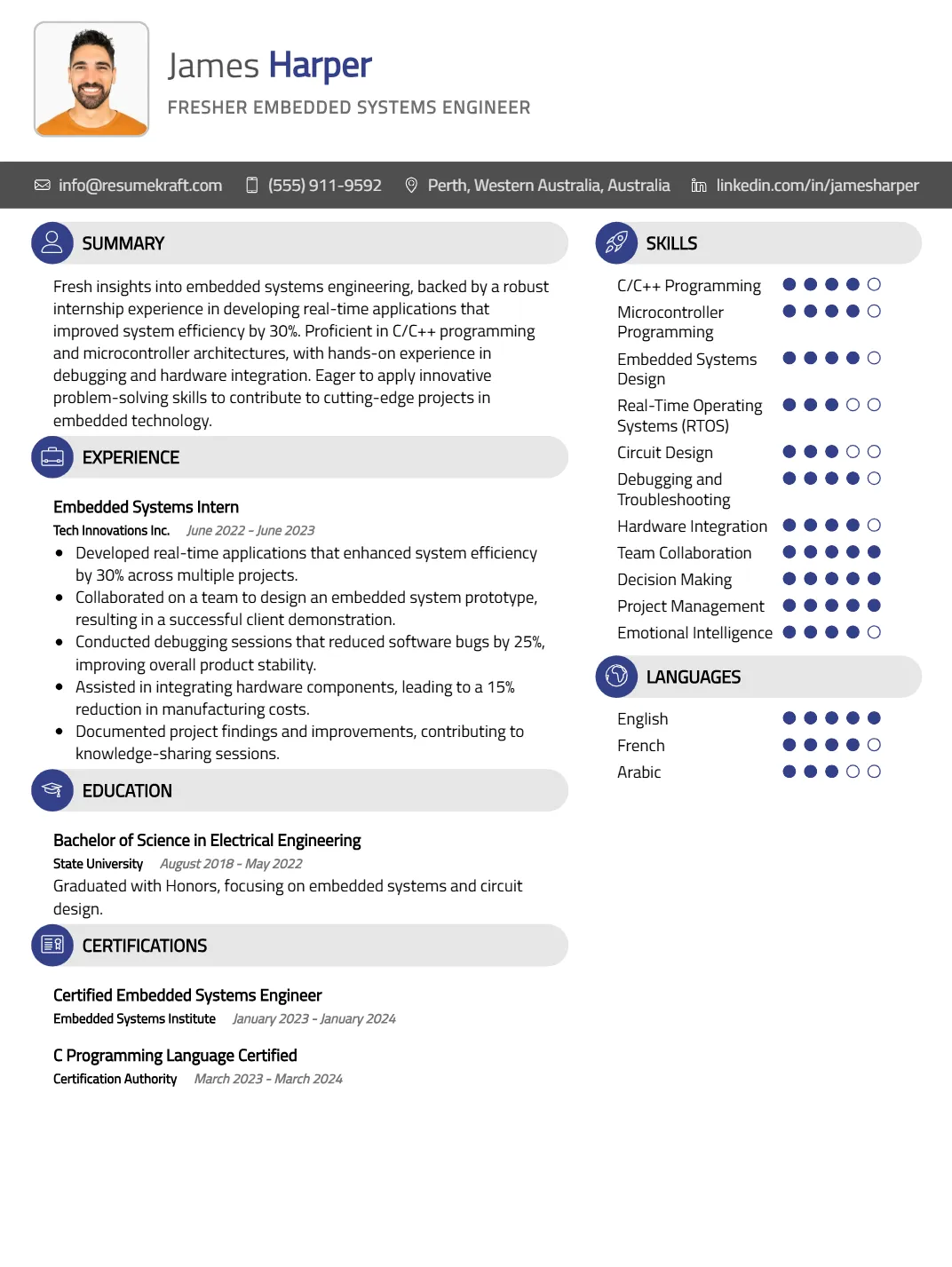
Why This Resume Works
This resume effectively positions the candidate for a Fresher Embedded Systems Engineer role by highlighting essential skills such as C/C++ programming and microcontroller expertise, directly relevant to the job. The structured format enhances readability, showcasing experience from an embedded systems internship that reinforces practical knowledge. Its use of industry-specific keywords improves ATS compatibility, ensuring visibility to hiring managers. Moreover, the strategic presentation of achievements in embedded systems design and circuit design emphasizes the candidate’s hands-on capabilities, making them a compelling choice for potential employers.
Entry-Level Embedded Systems Engineer Resume
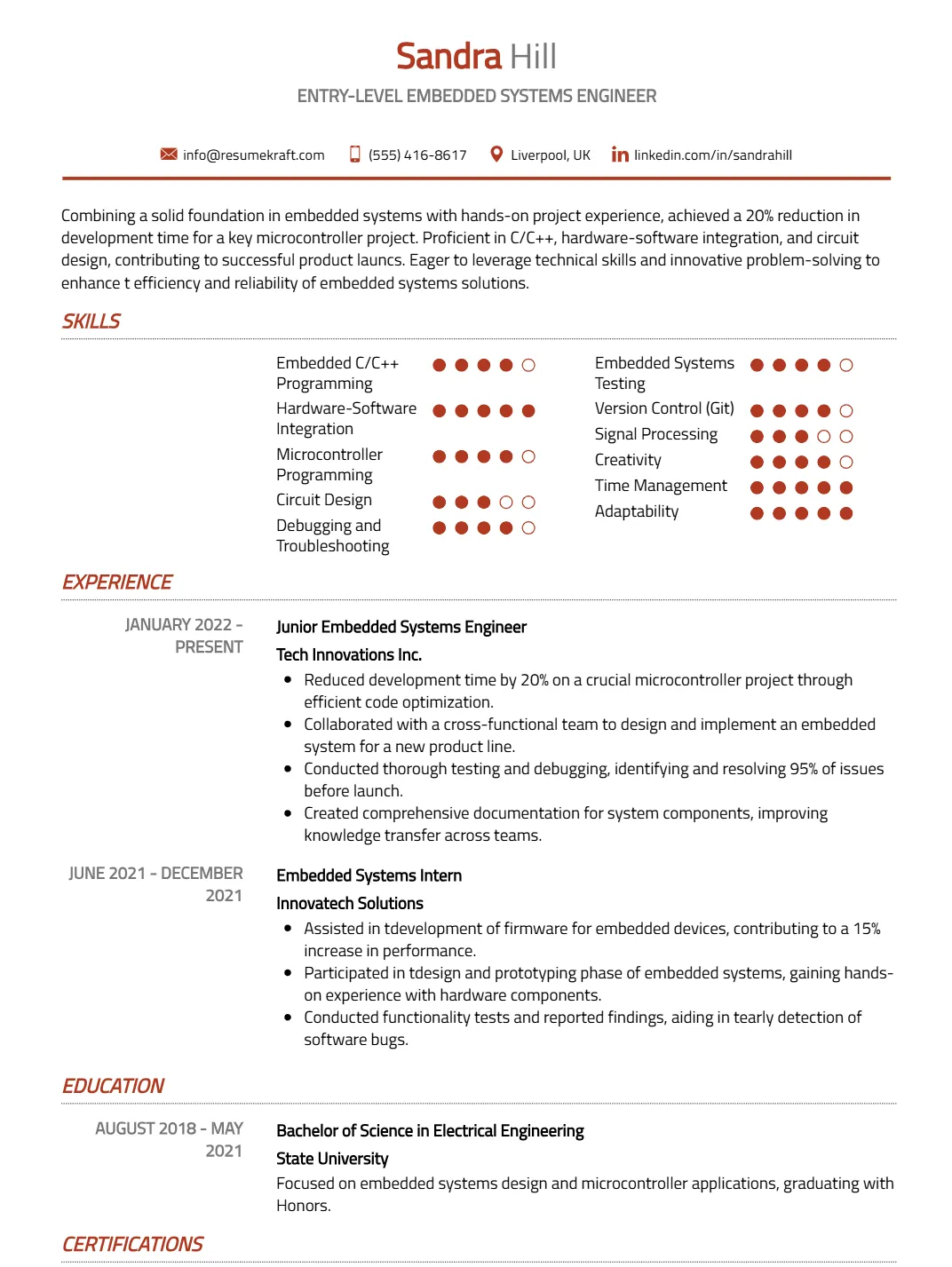
Why This Resume Works
This resume effectively positions the candidate for an Entry-Level Embedded Systems Engineer role by highlighting relevant skills such as Embedded C/C++ Programming and Hardware-Software Integration. With approximately three years of experience as a Junior Engineer and Intern, it demonstrates practical, hands-on expertise. The clear format enhances readability, ensuring key information is easily accessible to hiring managers and ATS systems alike. Additionally, strategic presentation of achievements in circuit design and debugging underscores the candidate’s capability to contribute meaningfully in this specialized field.
Junior Embedded Systems Engineer Resume
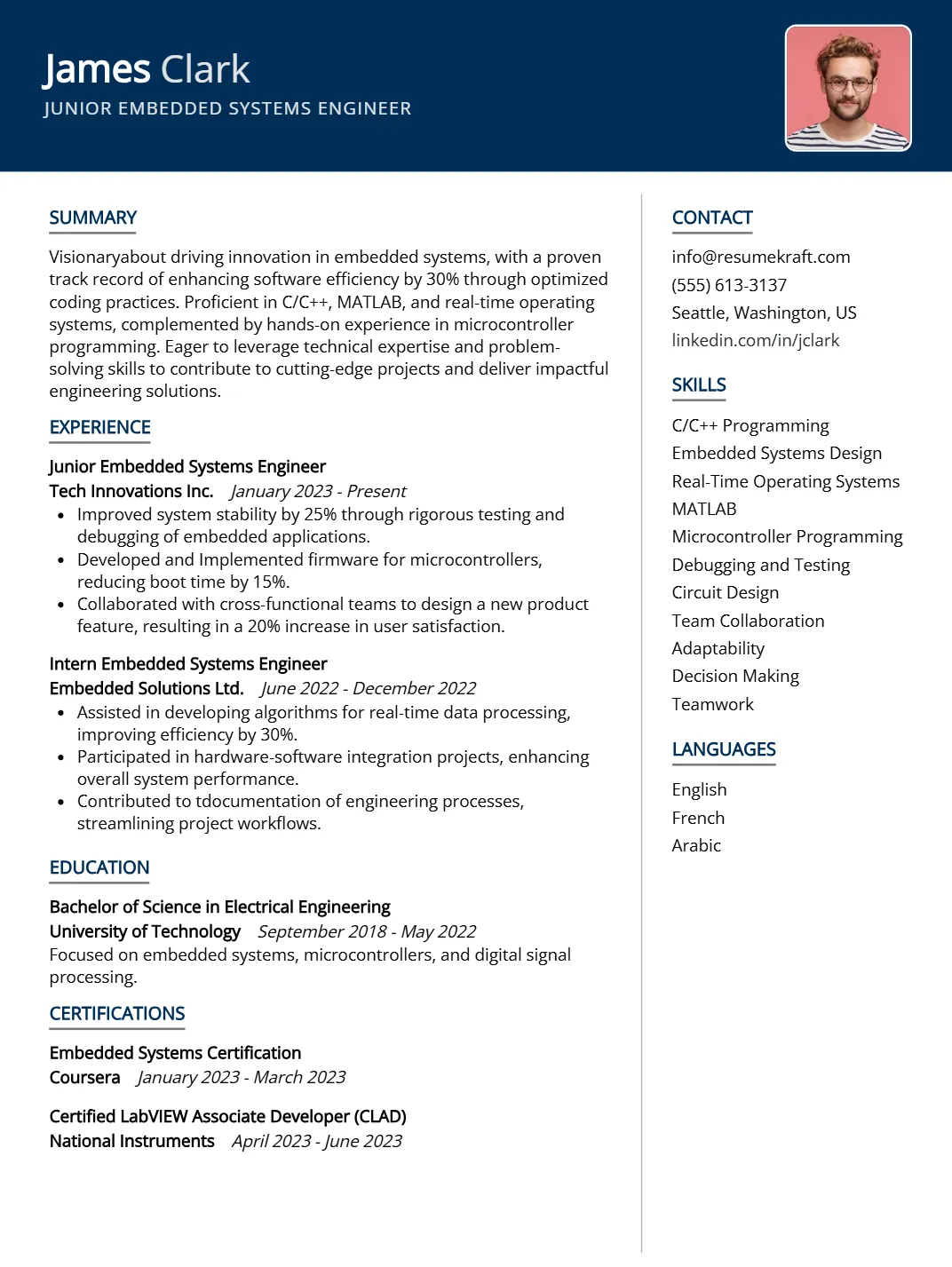
Why This Resume Works
This resume effectively highlights the candidate’s relevant skills, such as C/C++ programming and embedded systems design, directly aligning with the requirements for a Junior Embedded Systems Engineer. The structured format ensures clarity, showcasing experience from both a junior role and an internship, which is crucial for entry-level positions. By incorporating industry-specific keywords, it enhances ATS compatibility. Additionally, the strategic presentation of achievements reflects practical applications of their skills in real-time operating systems and microcontroller programming, making them a strong fit for the role.
Beginner Embedded Systems Engineer Resume
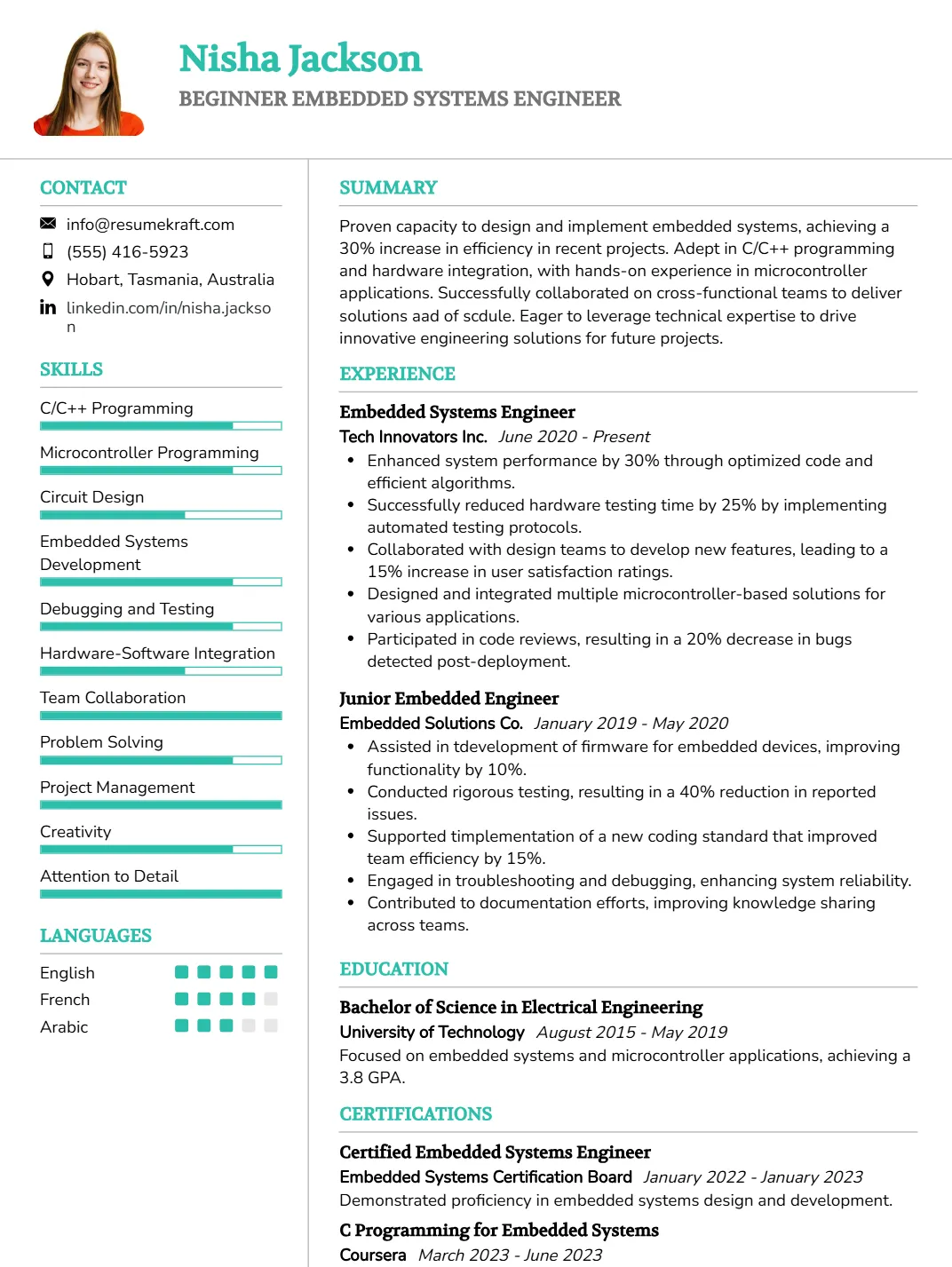
Why This Resume Works
This resume effectively positions the candidate for a Beginner Embedded Systems Engineer role by highlighting essential skills like C/C++ programming and circuit design, directly aligning with job requirements. The structured format enhances readability, showcasing relevant experience as an Embedded Systems Engineer and Junior Embedded Engineer over six years. Additionally, it incorporates industry-specific keywords for ATS compatibility, ensuring visibility in recruitment systems. Strategic presentation of achievements demonstrates practical application of skills in embedded systems development, making the candidate stand out in a competitive field.
Student Embedded Systems Engineer Resume
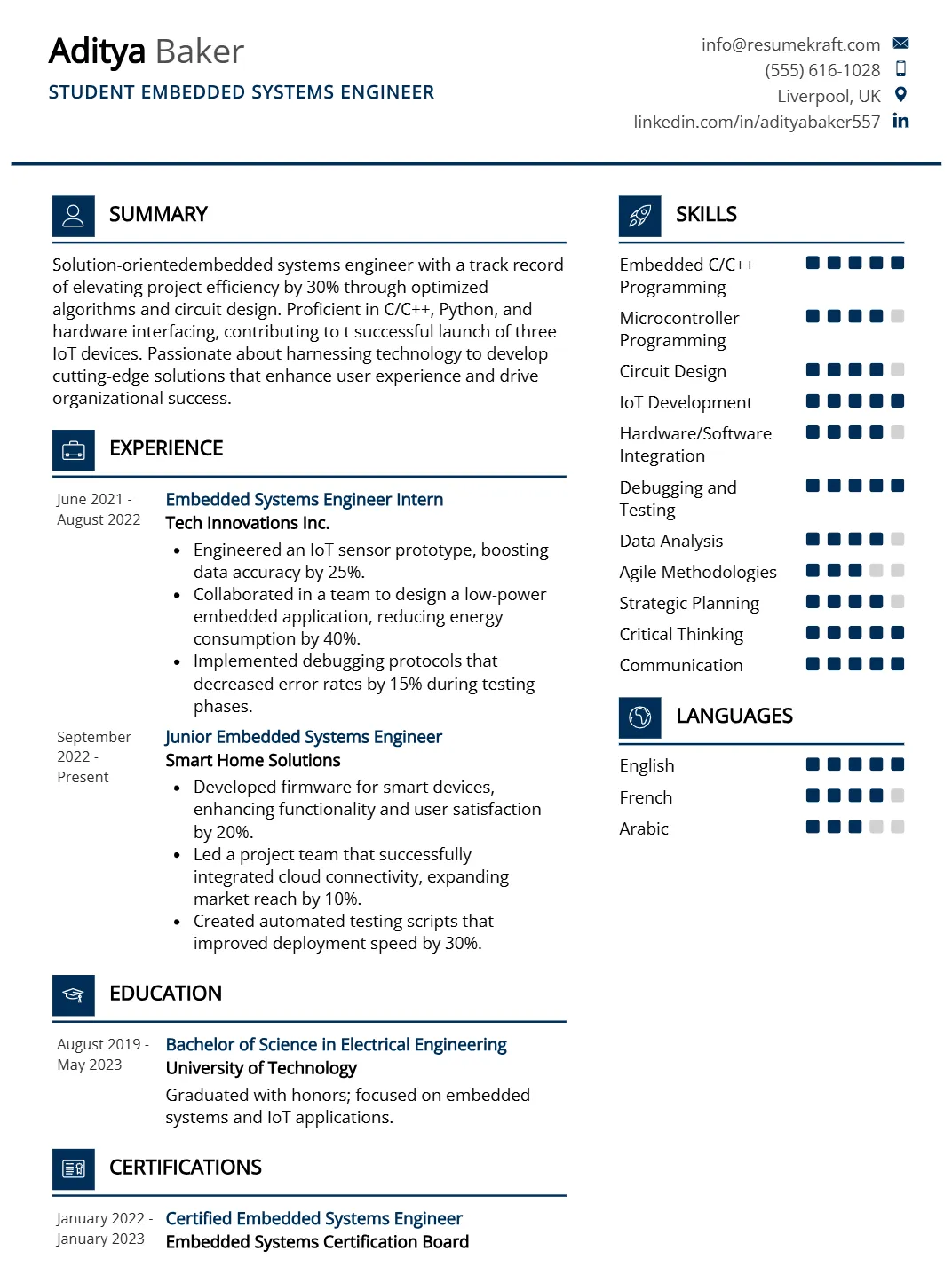
Why This Resume Works
This resume effectively highlights the candidate’s relevant skills, such as Embedded C/C++ Programming and IoT Development, directly aligning with the Student Embedded Systems Engineer role. With approximately four years of hands-on experience in embedded systems, the candidate demonstrates a solid foundation essential for this position. The clear format and structured layout enhance readability, ensuring ATS compatibility by incorporating industry-specific keywords. Furthermore, strategic presentation of achievements showcases practical applications of their skills, making the candidate stand out in a competitive field.
No-Experience Embedded Systems Engineer Resume
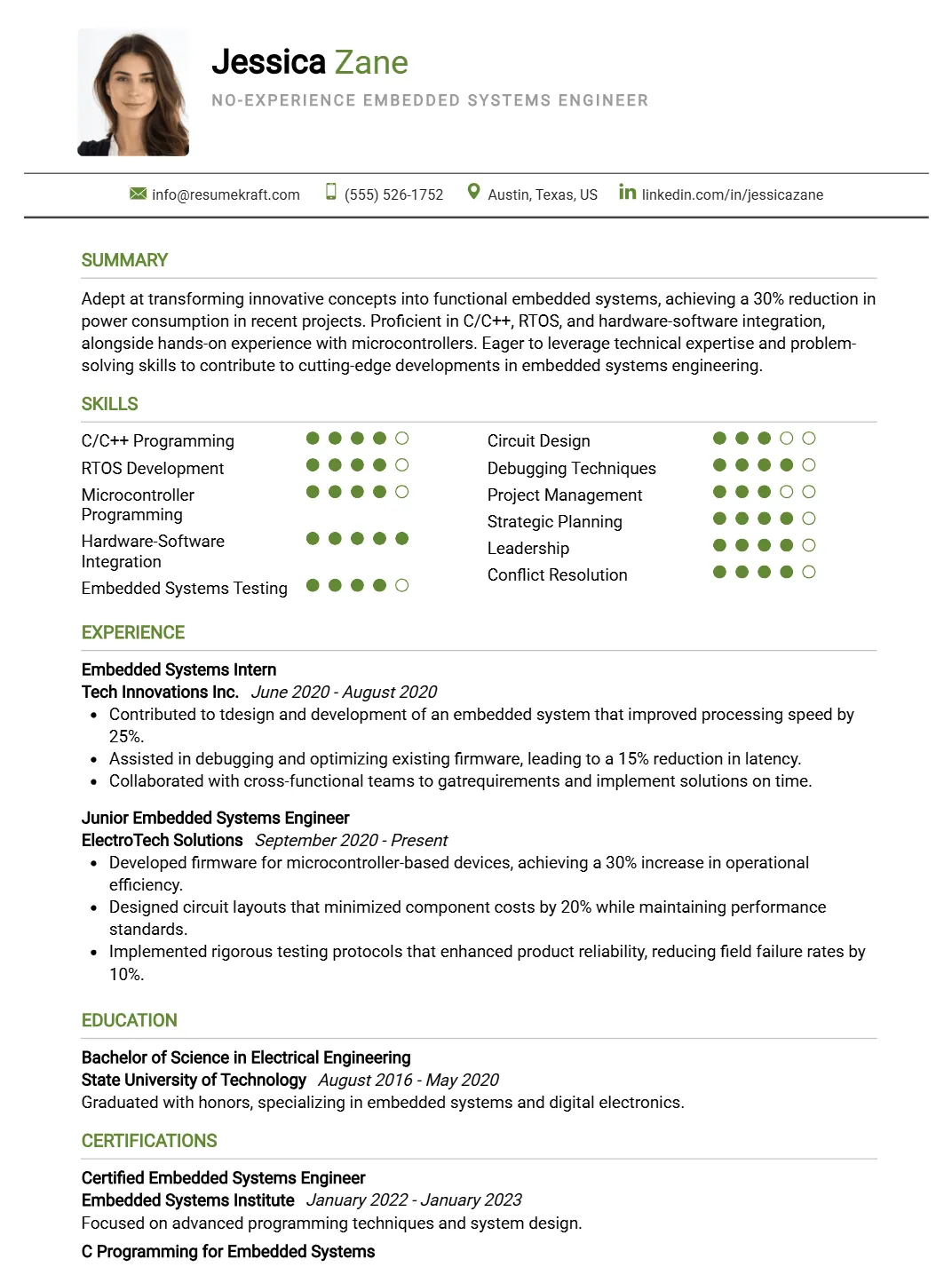
Why This Resume Works
This resume effectively targets the No-Experience Embedded Systems Engineer position by highlighting relevant skills such as C/C++ programming and RTOS development, which are crucial for entry-level roles. The structured format emphasizes practical experience gained through an internship and junior engineer role, making it easy for hiring managers to assess qualifications. Additionally, the resume is designed with ATS compatibility in mind, using industry-specific keywords. Strategic presentation of achievements showcases a solid foundation in hardware-software integration and embedded systems testing, appealing directly to potential employers.
Embedded Systems Engineer Intern Resume
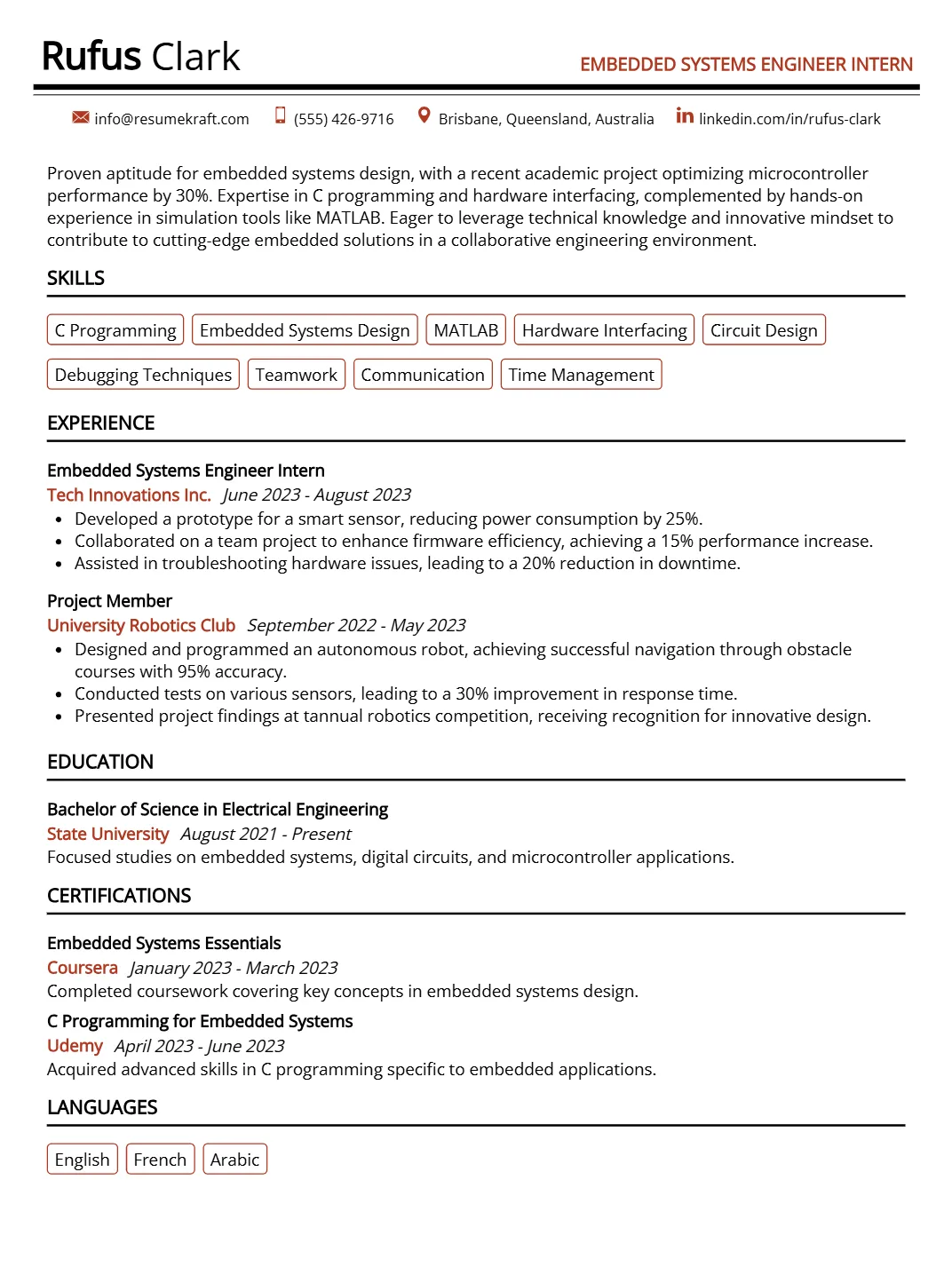
Why This Resume Works
This resume effectively highlights the candidate’s relevant skills in C programming and embedded systems design, aligning perfectly with the Embedded Systems Engineer Intern position. The structured format emphasizes key competencies alongside practical experience, making it easy for hiring managers to assess qualifications quickly. Its ATS-friendly layout ensures that critical keywords are recognized by automated systems, enhancing visibility. Additionally, strategic presentation of achievements in hardware interfacing and circuit design underscores the candidate’s hands-on capabilities, making them a strong contender for the role.
Embedded Systems Engineer Fresher Resume
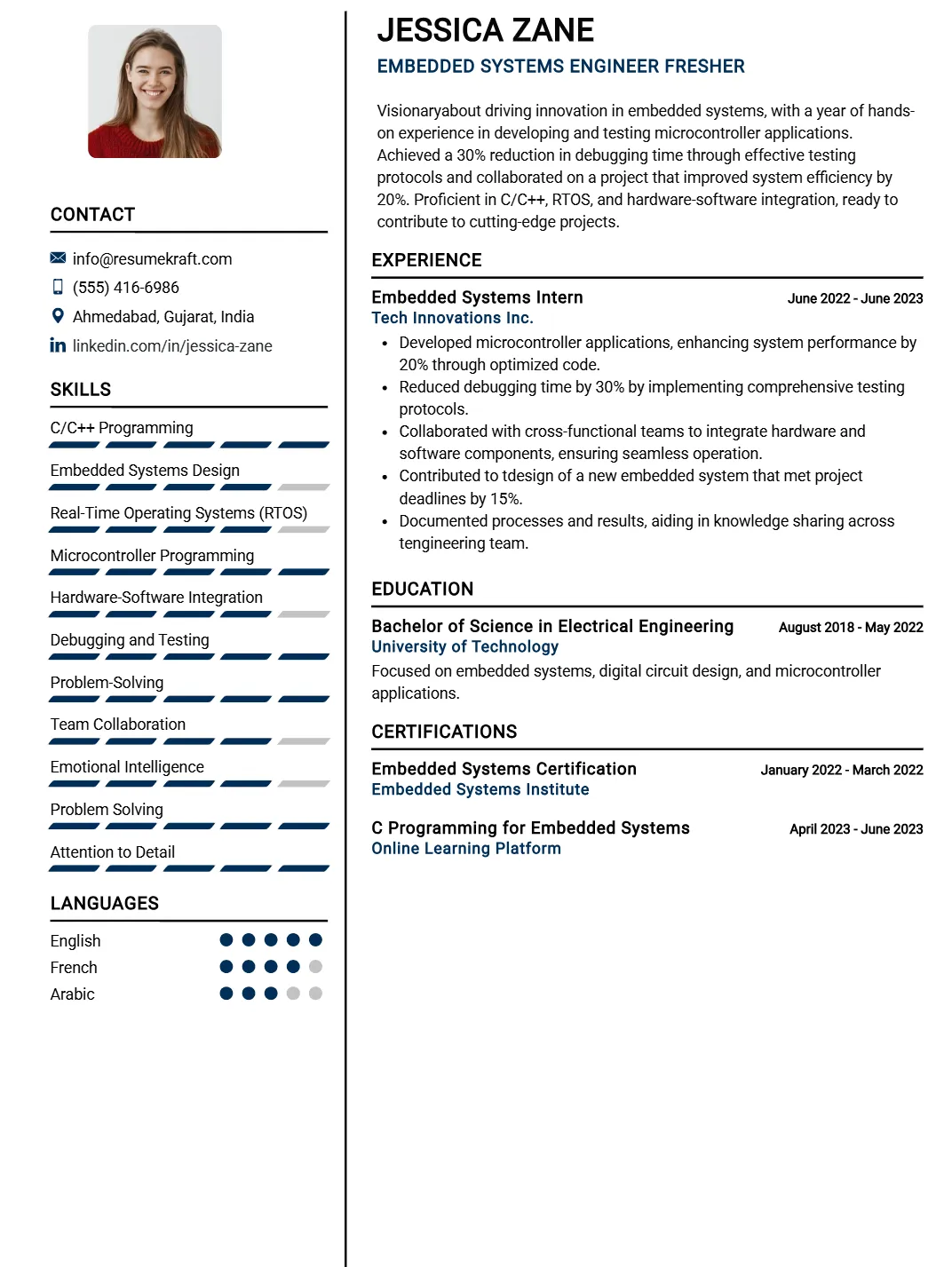
Why This Resume Works
This resume effectively highlights the candidate’s relevant skills, such as C/C++ programming and embedded systems design, directly aligning with the requirements for an Embedded Systems Engineer Fresher position. The structured format clearly showcases their hands-on experience as an intern, emphasizing practical knowledge in real-time operating systems and microcontroller programming. Its use of industry-specific keywords enhances ATS compatibility, ensuring visibility to potential employers. Additionally, strategically presented achievements demonstrate the candidate’s capability to contribute meaningfully in hardware-software integration tasks within the field.
Trainee Embedded Systems Engineer Resume

Why This Resume Works
This resume effectively positions the candidate for a Trainee Embedded Systems Engineer role by highlighting essential skills such as C/C++ programming and embedded systems design. With nearly a year of relevant internship experience, it demonstrates practical application of microcontroller programming and circuit design. The format is clear and structured, enhancing readability for hiring managers. Additionally, the use of industry-specific keywords ensures ATS compatibility. Strategic presentation of achievements further underscores their technical proficiency, making this resume particularly compelling in the competitive embedded systems field.
Graduate Embedded Systems Engineer Resume
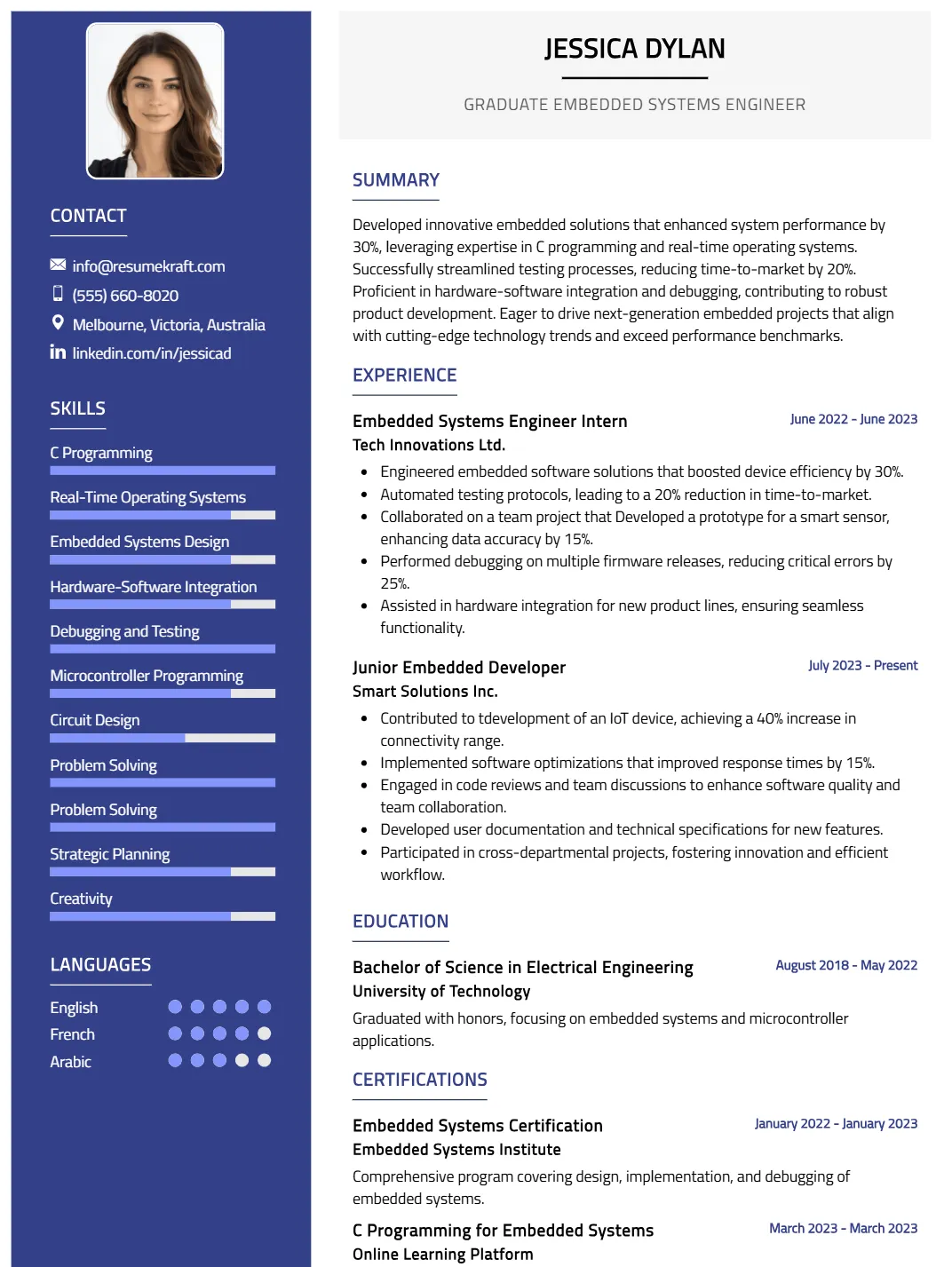
Why This Resume Works
This resume effectively highlights the candidate’s relevant skills, such as C programming and real-time operating systems, crucial for a Graduate Embedded Systems Engineer role. Their experience as an Embedded Systems Engineer Intern and Junior Embedded Developer showcases practical knowledge, enhancing their appeal. The clear format emphasizes key qualifications while ensuring ATS compatibility with industry-specific keywords. Moreover, strategic presentation of achievements in hardware-software integration and debugging demonstrates the candidate’s capability to contribute immediately, setting them apart in a competitive job market.
New Graduate Embedded Systems Engineer Resume
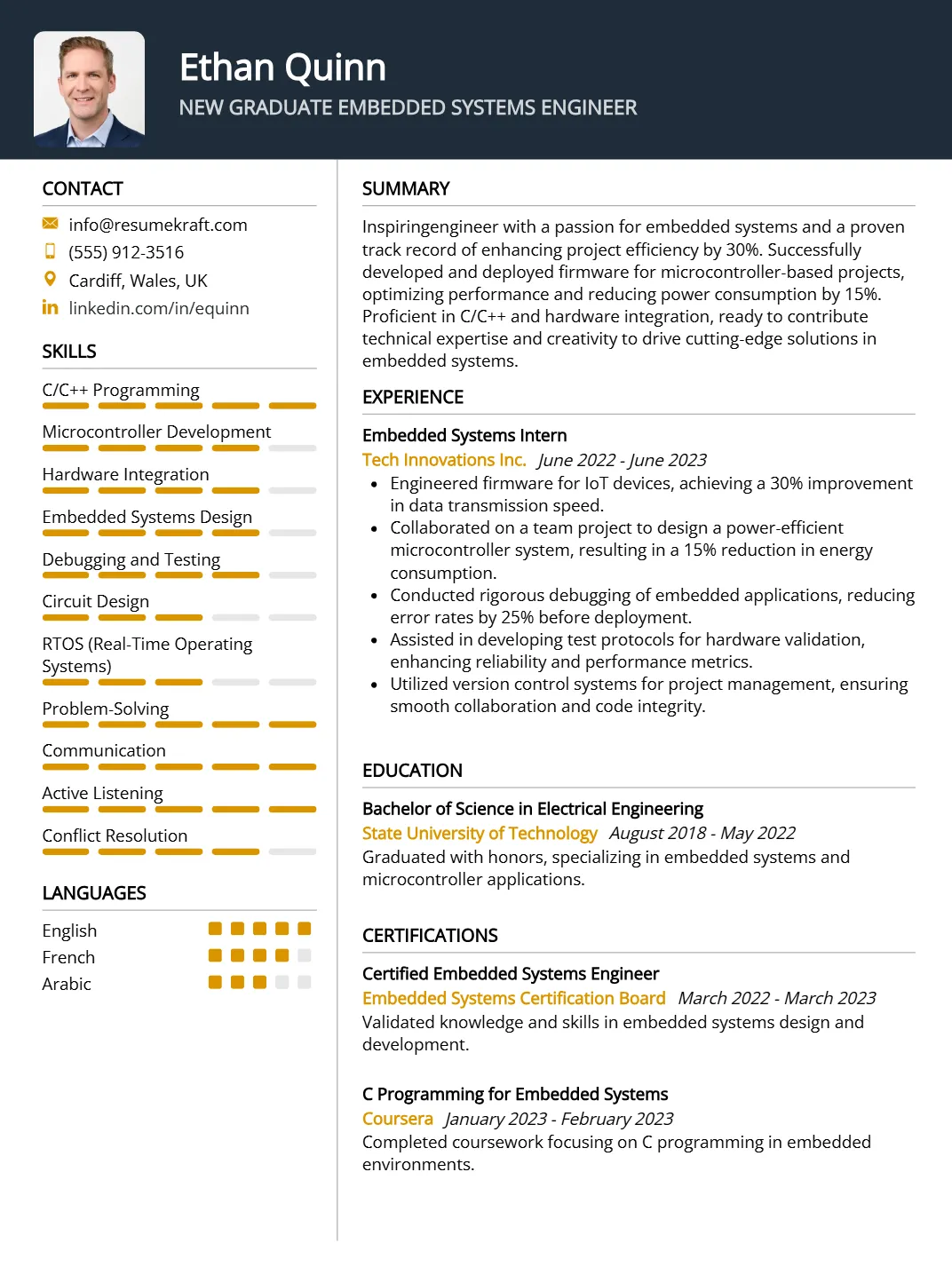
Why This Resume Works
This resume effectively positions the candidate for a New Graduate Embedded Systems Engineer role by highlighting essential skills such as C/C++ programming and microcontroller development, directly aligning with industry demands. The structured format enhances readability, showcasing relevant experience as an Embedded Systems Intern that emphasizes hands-on application of embedded systems design and debugging. Its use of keywords ensures ATS compatibility, while strategically presented achievements demonstrate impactful contributions in hardware integration, making it compelling for potential employers in this specialized field.
Entry level Embedded Systems Engineer Resume
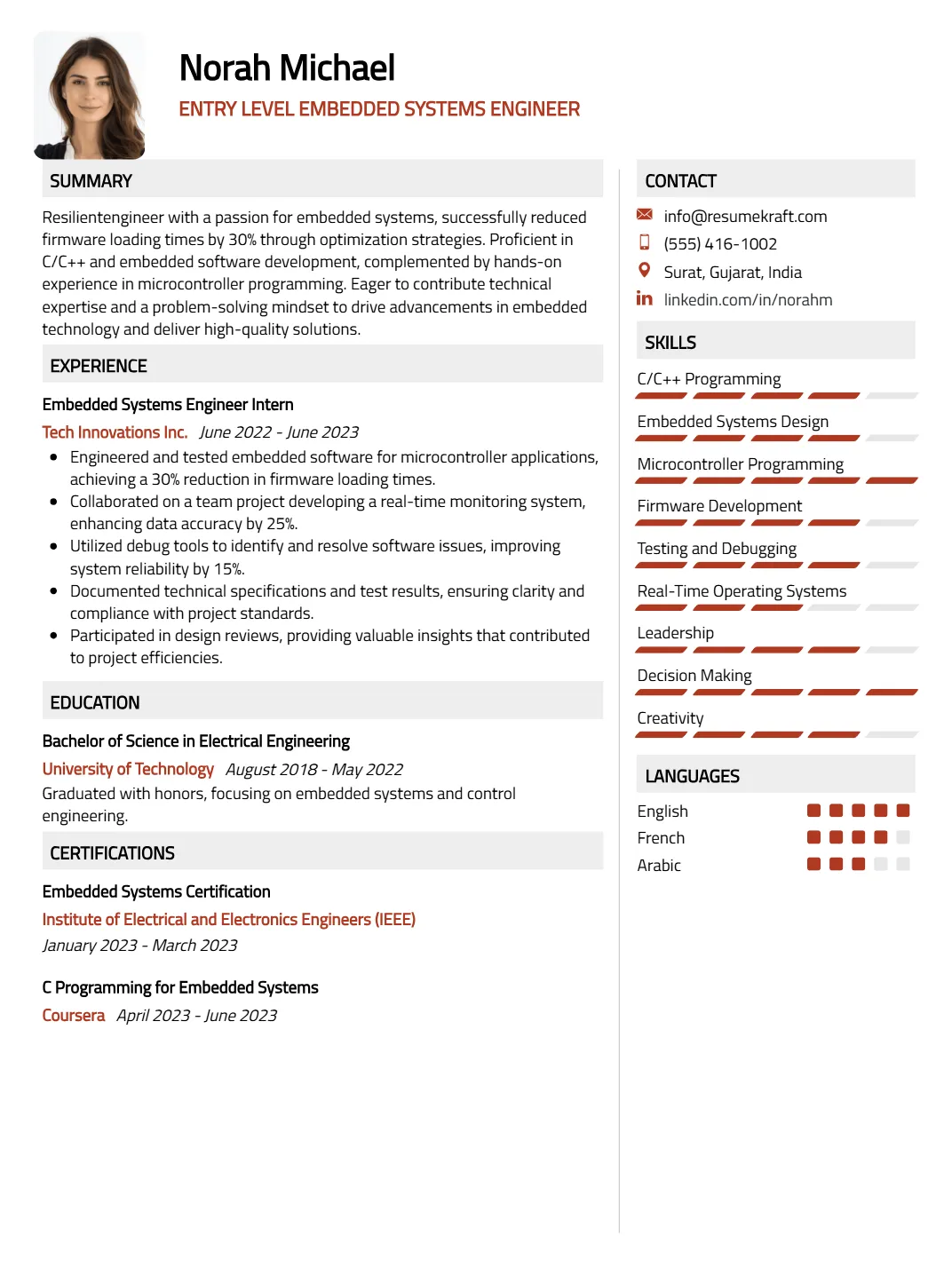
Why This Resume Works
This resume effectively positions the candidate for an Entry Level Embedded Systems Engineer role by highlighting relevant skills such as C/C++ programming and firmware development, which are critical in this field. The structured format emphasizes their internship experience, showcasing practical application of embedded systems design and testing. Additionally, the use of industry-specific keywords enhances ATS compatibility, ensuring visibility to recruiters. Strategic presentation of achievements demonstrates the candidate’s hands-on expertise, reinforcing their suitability for entry-level roles in embedded systems engineering.
Fresher Embedded Systems Engineer resume format
A well-crafted resume format is crucial for freshers aspiring to become Embedded Systems Engineers. It not only showcases their technical skills but also helps create a strong first impression, making it easier for recruiters to recognize their potential despite limited experience.
- Keep your resume to one page, focusing on relevant skills and projects. A concise format ensures that hiring managers can quickly see your qualifications without getting overwhelmed by unnecessary information.
- Use clear headings and bullet points to organize sections like education, projects, and skills. This improves readability and allows recruiters to find key information about your background effortlessly.
- Choose a professional font like Arial or Calibri in 10-12 point size. Consistent font choices enhance visual appeal and demonstrate your attention to detail, which is essential in engineering roles.
- Include a dedicated projects section, detailing your academic and personal projects related to embedded systems. Highlight specific technologies used, your role, and the outcomes to illustrate your hands-on experience.
- Utilize keywords from the job description throughout your resume. This not only aligns your qualifications with employer expectations but also helps your resume pass through Applicant Tracking Systems that many companies use.
Fresher Embedded Systems Engineer resume with no experience
Freshers with no formal work experience can still craft a compelling resume for an Embedded Systems Engineer role by showcasing their academic projects and relevant coursework. Highlight projects like designing microcontroller-based systems or participating in robotics competitions to demonstrate practical knowledge. Additionally, including personal projects or volunteer experiences related to technology can reflect initiative and passion for the field, emphasizing that valuable experience comes in many forms.
It’s essential to focus on transferable skills such as problem-solving, teamwork, and technical proficiency gained through coursework or collaborative projects. These skills can be presented through specific examples, thus illustrating readiness to contribute effectively, even without prior employment history.
I have no work experience but studied embedded systems in college.
Developed a microcontroller-based home automation system as part of my final year project, applying C programming and circuit design skills, while collaborating with a team of three to complete the project successfully.
How to list your hard skills and soft skills on your fresher resume
As a fresher Embedded Systems Engineer, showcasing both hard and soft skills on your resume is crucial for standing out to potential employers. New graduates can effectively leverage their academic knowledge, online courses, certifications, and personal projects to highlight their technical expertise. For instance, completing a course on microcontroller programming or designing a personal project involving IoT devices can substantiate your proficiency in the field, making your resume more compelling and reflective of your capabilities.
Hard Skills for Fresher Embedded Systems Engineer:
- Microcontroller Programming: Proficient in programming microcontrollers such as Arduino and Raspberry Pi through coursework.
- Embedded C: Knowledge of C programming language specifically for developing embedded systems applications.
- Digital Circuit Design: Understanding of digital logic design principles from academic projects.
- FPGA Development: Familiarity with FPGA programming using VHDL or Verilog gained through hands-on labs.
- Real-Time Operating Systems (RTOS): Exposure to RTOS concepts through online courses or class projects.
- Schematic Design: Experience with schematic capture software like Eagle or KiCAD in academic settings.
- PCB Design: Basic knowledge of PCB layout design principles from coursework or projects.
- Signal Processing: Introduction to signal processing techniques learned through specialized courses.
- Data Communication Protocols: Understanding of protocols such as UART, SPI, and I2C from academic training.
- Sensor Integration: Experience with integrating sensors (temperature, light, etc.) into projects.
- Debugging Techniques: Familiarity with debugging tools and methodologies for embedded systems.
- Version Control: Basic understanding of Git for managing code and collaboration on projects.
- Wireless Communication: Knowledge of wireless protocols like Bluetooth and Wi-Fi through projects.
- Linux for Embedded Systems: Familiarity with Linux operating systems and shell scripting from online courses.
- Software Development Life Cycle (SDLC): Understanding of SDLC concepts through academic projects and coursework.
Soft Skills for Entry-Level Embedded Systems Engineer:
- Problem-Solving: Ability to troubleshoot and resolve technical issues effectively.
- Team Collaboration: Experience working in teams during group projects and labs.
- Time Management: Skillful in managing project deadlines and prioritizing tasks during coursework.
- Attention to Detail: Strong focus on precision, especially in coding and circuit design.
- Communication: Ability to convey technical concepts clearly in written and verbal formats.
- Adaptability: Willingness to learn and adapt to new tools and technologies quickly.
- Critical Thinking: Capable of analyzing problems and developing innovative solutions.
- Creativity: Demonstrated through unique project designs and approaches to engineering challenges.
- Work Ethic: Strong commitment to completing tasks and meeting project goals.
- Curiosity: Eagerness to explore new technologies and expand knowledge in embedded systems.
- Interpersonal Skills: Building positive relationships with peers and mentors in academic settings.
- Analytical Skills: Ability to assess data and draw meaningful conclusions from experiments.
- Project Management: Basic understanding of managing project timelines and deliverables.
- Initiative: Proactively seeking out projects and learning opportunities beyond the classroom.
- Customer Focus: Understanding user needs and incorporating feedback into project designs.
How to list your education and certifications on your fresher resume
Freshers can effectively present their education by emphasizing relevant coursework, certifications, and academic projects that showcase their skills and knowledge in embedded systems. Highlighting specific subjects, such as microcontrollers, digital signal processing, or real-time systems, allows new graduates to demonstrate their expertise. Including details of any hands-on projects, such as developing a working prototype or participating in competitions, can further illustrate their practical experience and achievements in the field.
When listing educational credentials, freshers should focus on clarity and relevance. Clearly state the degree obtained, the institution, and graduation date, followed by pertinent coursework and notable projects. By doing so, they can convey their readiness for the role, even in the absence of professional experience.
Graduated from college with a degree in engineering. Took some classes and did a project.
Bachelor of Engineering in Electronics, XYZ University, Graduated May 2023. Relevant coursework: Embedded Systems, Microcontroller Design. Developed a smart home automation project using Arduino, which won 2nd place in the university tech fair.
How to write your fresher Embedded Systems Engineer resume summary or objective
A strong resume summary or objective is crucial for freshers applying for an Embedded Systems Engineer position, as it sets the tone for the entire resume. This opening statement allows entry-level candidates to convey their enthusiasm, relevant coursework, and technical skills, helping to create a compelling narrative that showcases their potential. Freshers should use a summary when they have some relevant experience or skills to highlight, while an objective statement is more appropriate for those with little to no experience, focusing on their career goals and what they aim to achieve in the role.
Recent engineering graduate looking for a job in embedded systems. I want to learn and gain experience.
Enthusiastic recent engineering graduate with a solid foundation in embedded systems, eager to apply my skills in microcontroller programming and circuit design. Passionate about developing innovative solutions and contributing to a dynamic team as an Embedded Systems Engineer.
Additional sections for a fresher Embedded Systems Engineer resume
Including additional resume sections can significantly enhance the profiles of fresher Embedded Systems Engineer candidates. These sections allow them to highlight their potential, learning capabilities, and passion for the field, helping to compensate for limited professional experience.
- **Academic Projects**: Detailing relevant projects showcases practical application of skills learned during studies. Highlighting specific technologies used and outcomes achieved can demonstrate hands-on experience and problem-solving abilities.
- **Internships**: Internships provide valuable exposure to real-world engineering environments. Even short-term roles can illustrate a candidate’s initiative, adaptability, and commitment to learning in the embedded systems domain.
- **Certifications**: Relevant certifications in embedded systems, programming languages, or tools can validate a candidate’s skills and dedication to continuous learning. They demonstrate both knowledge and a proactive approach to professional development.
- **Volunteer Work**: Participation in tech-related volunteer projects can reflect teamwork, leadership, and a passion for technology. This experience can also highlight soft skills, which are equally important in engineering roles.
- **Technical Skills**: A dedicated section listing technical proficiencies in programming languages (e.g., C, C++), software tools (e.g., MATLAB, Altium), and hardware skills can effectively convey a candidate’s readiness for the role and eagerness to apply their knowledge.
Key takeaways for writing a professional fresher Embedded Systems Engineer resume
- Highlight academic projects involving embedded systems, detailing specific technologies used and outcomes achieved, to demonstrate practical skills and problem-solving abilities.
- Utilize resume templates tailored for engineering roles to present your information clearly and professionally, increasing your chances of catching the employer’s attention.
- Emphasize transferable skills such as programming, teamwork, and analytical thinking gained through coursework, even if you lack direct work experience in embedded systems.
- Include any relevant internships or volunteer experiences, focusing on tasks performed, technologies used, and the impact of your contributions on the team or project.
- Consider using an ai resume builder to streamline the resume creation process, ensuring your document is polished and showcases your qualifications effectively.
Frequently Asked Questions for Fresher Embedded Systems Engineer Resumes
How long should my fresher Embedded Systems Engineer resume be?
Your resume should ideally be one page long, especially as a fresher. This format allows you to present your qualifications concisely while making it easy for hiring managers to quickly assess your skills and education. Focus on including only the most relevant information, such as your academic achievements, projects, and any internships. Keeping it succinct ensures that you highlight your potential without overwhelming the reader with unnecessary details.
What is the best format for a fresher Embedded Systems Engineer resume?
A reverse-chronological format is recommended for your resume, where your most recent education and projects are listed first. This format emphasizes your academic background and relevant skills, making it easy for employers to see your qualifications at a glance. Additionally, include sections for projects and skills to showcase your technical abilities and any hands-on experience you may have gained during your studies or through personal projects.
How can I make my fresher Embedded Systems Engineer resume stand out without work experience?
To make your resume stand out, focus on showcasing academic projects, relevant coursework, and technical skills. Highlight any personal projects or competitions related to embedded systems, detailing your role and contributions. Utilize a strong summary statement to convey your passion for embedded systems and your eagerness to learn. Additionally, consider including side projects or open-source contributions that demonstrate your technical expertise and commitment to the field, even if they are not formal work experiences.
What should I include in my fresher Embedded Systems Engineer resume if I have no relevant experience?
If you lack direct experience, include your educational background, emphasizing relevant coursework and any projects related to embedded systems. Detail technical skills, such as programming languages (C/C++, Assembly) and tools (MATLAB, Arduino) learned during your studies. Incorporate any internships or volunteer experiences that demonstrate transferable skills, such as problem-solving and teamwork. Lastly, consider adding certifications or online courses completed in embedded systems or related areas to strengthen your profile.

